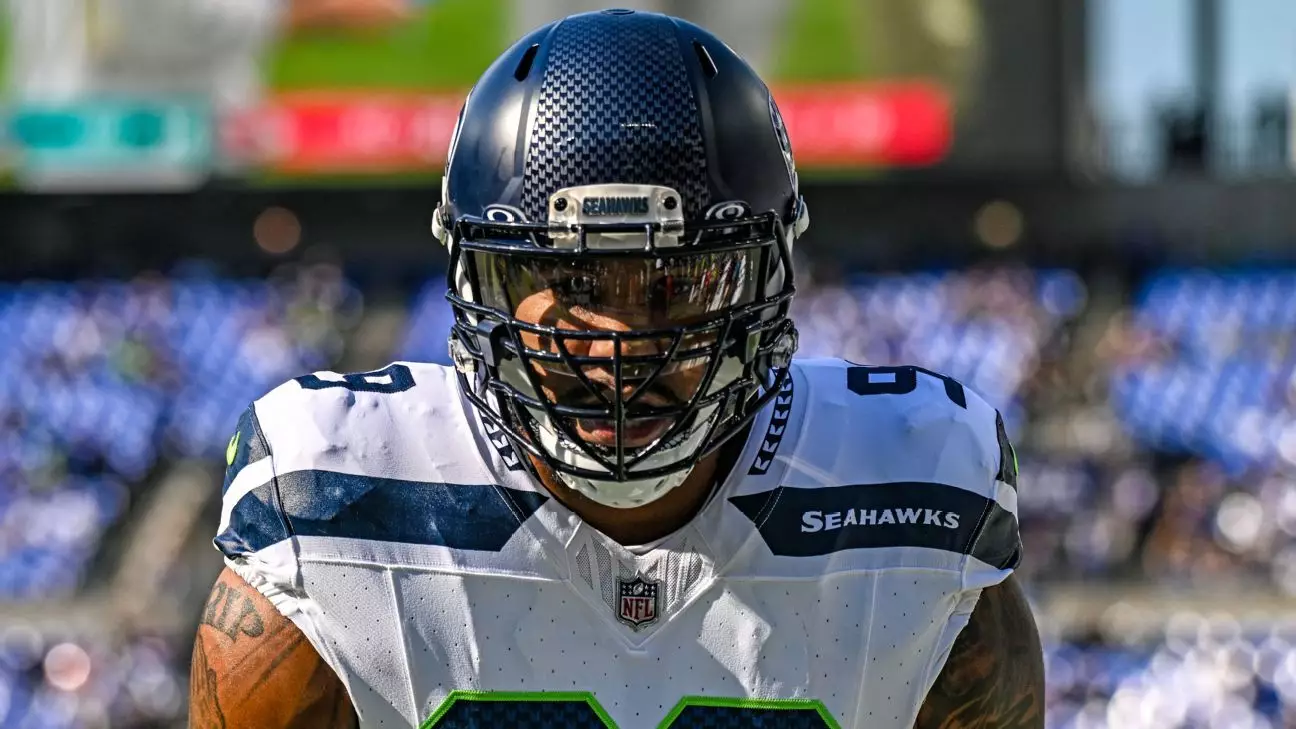The National Football League (NFL) has long been a stage for exceptional talent and competitiveness, where performances are scrutinized not only by fans and pundits but also by the players themselves. Among the Seattle Seahawks, two players found themselves at opposite ends of the Pro Bowl selection process: cornerback Devon Witherspoon marked a significant achievement, while veteran defensive tackle Leonard Williams faced disappointment. Their contrasting experiences highlight the complexities and perceived injustices of the Pro Bowl selection criteria.
Devon Witherspoon: A Rising Star
Devon Witherspoon stands out as a beacon of hope and talent for the Seahawks organization. Selected fifth overall in the 2023 NFL Draft, he has quickly made a name for himself, earning his second consecutive Pro Bowl selection. Despite a stat line that some might consider underwhelming—no interceptions and just one sack—his impact on the field has been undeniable. Witherspoon’s ability to disrupt opposing offenses and blanket receivers speaks volumes about his potential and the respect he commands amongst his peers and the league.
His achievement places him among just a handful of players who have been able to secure Pro Bowl nods in their first two seasons, a testament to his talent and hard work. Witherspoon’s journey embodies the essence of determination and progress, as he navigates the challenges of becoming an elite player in a league filled with competition.
On the other hand, Leonard Williams’ reaction to not being selected for the Pro Bowl embodies a sentiment that many players share when their hard work goes unrecognized. With a career-best 9.0 sacks alongside impressive stats in tackles for loss and quarterback hits, Williams expected to be included among the elite interior defenders in the NFC. His contribution to the Seahawks’ defensive front has been substantial, and he has consistently been a game-changer. Furthermore, Williams made NFL history by returning an interception for a touchdown—an incredible feat for a defensive lineman, highlighting his versatility and skill.
Williams’ frustration is compounded by past experiences where he was overlooked despite strong performances, including his snub in 2020 when he recorded 11.5 sacks with the New York Giants. The ache of unrecognized talent resonates deeply among athletes who understand that accolades can significantly impact their legacies. As he eloquently expressed, “I feel like I definitely deserved it this year,” his sentiment illuminates the emotional weight that comes with such decisions.
The Bias Debate
The perceptions of bias in Pro Bowl selections can be a contentious topic. Seahawks quarterback Geno Smith expressed disbelief at Williams’ exclusion, channeling the frustrations that many feel towards the voting process. Smith’s assertions about inherent biases in selections raised eyebrows, suggesting that geographical and media market factors play a role in recognition. This perspective hints at a broader issue within the NFL—a spotlight that often shines more brightly on certain franchises and players, leaving others in the shadows.
Williams himself attempted to downplay the significance of his snub, stating that he was fortunate to process his feelings before addressing media inquiries. However, his acknowledgment that it was indeed “frustrating” encapsulates a complex relationship between deserving recognition and the often arbitrary nature of selections. As a potential alternate, Williams remains skeptical, reducing optimism by emphasizing that merely being in consideration feels insufficient.
Despite the disappointment, Williams graciously expressed happiness for his fellow players who made the Pro Bowl, recognizing their deserving performances. This sportsman-like attitude is commendable and showcases camaraderie within the league, but it also brings forth a crucial question: Why do such accolades carry so much weight? For players, Pro Bowl selections often affect contract negotiations, endorsement deals, and overall legacy within the sport. They’re a reflection of prestige that can elevate one’s status in the eyes of fans and future employers.
Furthermore, Witherspoon’s candid remarks about Williams’ exclusion serve as a reminder that the voting and selection process may require review and reform. The disparity between performances and recognition raises valid points about how players are evaluated and the criteria set for determining who is deemed “elite.”
A Season to Remember
The contrasting experiences of Witherspoon and Williams during this year’s Pro Bowl selections shed light on the ongoing challenges within NFL recognition systems. While Witherspoon celebrates immediate achievements as an emerging talent, Williams wrestles with the disappointment of exclusion despite a stellar season. Their narratives contribute to the broader discourse on fairness and acknowledgment within professional sports, resonating with fans, players, and analysts alike. As the NFL continues to evolve, understanding and addressing these issues will be crucial for fostering a culture of inclusion and recognition for all.

